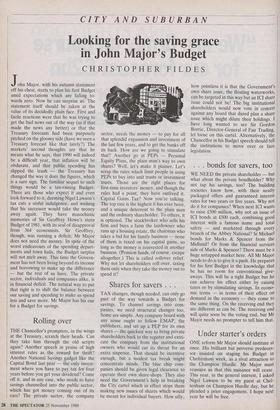CITY AND SUBURBAN
Looking for the saving grace in John Major's Budget
CHRISTOPHER FILDES
John Major, with his autumn statement off his chest, starts to plan his first Budget amid expectations which are falling to- wards zero. Now he can surprise us. The statement itself should be taken at the value of its decidedly plain face. First and facile reactions were that he was trying to get the bad news out of the way (as if that made the news any better) or that the Treasury forecasts had been purposely pitched on the gloomy side (have we seen a Treasury forecast like that lately?) The markets' second thoughts are that he means what he says, that 1990 will indeed be a difficult year, that inflation will be obdurate, and that public spending has slipped the leash — the Treasury has changed the way it does the figures, which is a sure sign. The familiar sequel to such things would be a tax-raising Budget. There are those who expect it and even look forward to it, deeming Nigel Lawson's tax cuts a sinful indulgence, and wishing that his successor would take the money away again. They have masochistic memories of Sir Geoffrey Howe's stern Budget of 1981, with its seal of disapproval from 364 economists. Sir Geoffrey, though, was running a deficit; Mr Major does not need the money. In spite of the worst endeavours of the spending depart- ments and town halls, the Budget surplus will not melt away. This time the Govern- ment has not been living beyond its income and borrowing to make up the difference — but the rest of us have. The private sector, individuals and companies alike, is in financial deficit. The natural way to put that right is to shift the balance between our saving and spending to make us spend less and save more. Mr Major has his cue for a Budget for savings.










































































 Previous page
Previous page